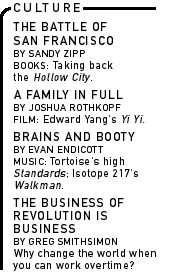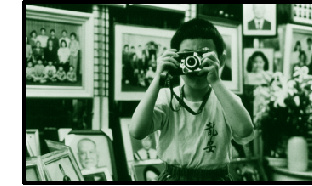

|

|

|

|
| |
|
|
|
Yi Yi (A One and a Two) It's hard to imagine a Taiwanese saga soaring into American movie theaters these days without the benefit of wires, as hung in so many of Asia's gravity-defying, better-known exports. But wouldn't it be nice if Edward Yang's masterful family drama Yi Yi, already lauded at Cannes and around the world, proved the exception? There's no kicking, crouching or hiding here: only the dignified bearing of the modern world by one extended Taipei clan, the Jians. Yang's triumph lies in his deepening of their everyday trials into something profound; Yi Yi is several lives beautifully observed and quietly made sacred--to watch them evolve over three hours is to realize how much more films could be (or might have been) if they spoke instead of shouted. Yi Yi translates closer to "one-one" or "individually," and while Yang's chosen English-language
The temptation is great to try to find a prismatic character to focus all this dramatic light--perhaps the middle-aged father, "NJ" (Wu Nienjen), whose circumstances seem most in flux: a partnership in a computer company teetering on the edge of bankruptcy, plus some precarious second-guessing that comes after a charged encounter with an old flame. (Wu's performance is a complex marvel of domestic befuddlement yielding to spontaneity.) But such a single identification would be a violation of the film's most provocative gesture, a complete eschewal of close-ups, revealing in their absence the directorial manipulations of even the most sensitive of family albums like Ingmar Bergman's Fanny and Alexander. Magically, the effect isn't cold or distancing, but a portal to a deeper way in; Yang seems to have discovered that by taking several steps back, he can embrace all his players' interiors at once--a community of privacies. This is filmmaking at its most graciously egalitarian. It's also tribute to a superb company of actors who fill the spatial remove with tender uncertainties: NJ's wife Min-Min (Elaine Jin) breaks down before our eyes as she grasps futilely to convey her daily routine to her mother in a coma; their teen-age daughter Ting-Ting (Kelly Lee, fearlessly na•ve), awkwardly embarks on a first date; her inquisitive kid brother Yang-Yang (Jonathan Chang, eight years old and already formidable) possesses a strange serenity even while grappling with some rather advanced philosophical questions with the help of a still camera: "I can only see what's in front, not behind." Choice and fate play out in an electric city: Taipei, with its roiling economy of digital fortunes, seems to inform the push and pull of Yang's orchestration of mood. A bluish image of a fetus kicking in a sonogram plays over a business pitch for a new computer game promising "the limitless future." (Yang, who studied computer science, provides examples of technology mirroring life that are uncommonly sophisticated and humane.) Glinting streetlights reflected in glass strike refreshing resonance with the natural world's sparks; as in the recently released In the Mood for Love, rainstorms signal not gloom but charged-up passions. In one scene, Yang-Yang slips into a darkened classroom of girls watching an educational film about the origins of life; we're witnessing nothing less than his sexual awakening. Another thread subtly woven through Yi Yi concerns music--more specifically the refinement involved in echoing the melodies of others (presented as both enviable and hurtful). Two great artists emerge from the film's periphery: Mr. Ota (Issey Ogata, his voice a beautiful purr), a Japanese computer genius hoping to contract with NJ's company, and Lili (Adrian Lin), Ting-Ting's slightly older neighbor, a cellist. Both make indirect overtures to their new friends (Ota, in particular, casts an unbreakable spell over a raucous piano bar--and the entire film--with a darkly romantic rendition of the "Moonlight Sonata") and inspire them to follow their own pursuits of the heart. Love though, like music, has its own tricky rhythms, and Yang only deepens the theme with every tenuous step: Father and daughter, two unsteady soloists, are cross-cut on separate dates in the film's tour-de-force conclusion. There hasn't been a film in years that has so purely devoted itself
to the dreams and anxieties of the middle class. For good measure,
Yi Yi also includes moments of sheer exuberance: a rollicking
marriage procession that's almost deliriously giddy amid the hot-pink
decor of a banquet hall; a well-deserved soaking of a nasty teacher
with a water balloon. A review can only sketch what the rarest of
films do so fully. This is one of them.
|


